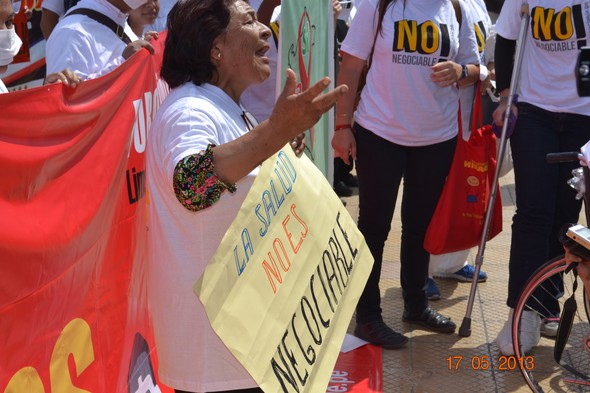TPP Puts Health, Environment, and National Sovereignty at Risk
Statement by Red Uniendo Manos Peru, Joining Hands Peru

A woman from La Oroya leads protestors in chants directed to the negotiators of the TPP in Lima in May 2013. Photo Courtesy of Red Uniendo Manos Peru.
On October 6, the twelve countries that have been negotiating the TPP for the past eight years reached an agreement. Now the agreement must be ratified by the Congress of each of those countries. Despite the celebratory words from the negotiators, they still have not released the final text.
What is the TPP?
The Transpacific Partnership (TPP) is a multilateral free trade agreement. Strongly promoted by the United States, the agreement involves eleven other countries: Japan, Australia, New Zealand, Malaysia, Brunei, Singapore, Vietnam, Canada, Mexico, Chile, and Peru. The agreement seeks to regulate a large number of issues, from the trade of agricultural products, to labor laws, to copyrights, patents, state investments and the environment. The TPP is the largest free trade agreement ever negotiated and comprises almost 40% of the global economy.
What are the dangers of the TPP for Peru?
Despite the secrecy of the negotiations, we know through leaked texts and more recently from commentaries made by some of the negotiators themselves that the TPP includes components that threaten the health, environment and national sovereignty to Peru.
- Greater Protections of Pharmaceutical Intellectual Property that will lead to higher costs of important medications for the general public. The TPP gives five years of data protection on biological drugs that are vital for treating metastatic cancers and autoimmune diseases, thus limiting access to such drugs and increasing their costs.
- Non-enforceable Environmental Protections that will allow for the continued illegal deforestation of the Amazon. Even though the TPP has an Environmental Chapter that expresses the interest of protecting important natural resources such as the Amazon Rainforest, it does not include a mechanism by which environmental protections can be enforced.
- Greater Rights for Foreign Investors that allow investors to avoid their environmental responsibilities (among others) and sue the State of Peru in foreign tribunals.. The TPP has an Investment Chapter that provides foreign investors with the Investor-State Dispute Settlement mechanism in which the investor can circumvent the domestic courts and judicial system of the country in which it is operating in order to challenge national laws anytime it considers them to be a threat to its profits.
What do we demand?
- Release the Complete Text immediately and put it up for public debate
- Do Not Ratify the TPP that includes the Investor-State Dispute Settlement
- Do Not Further Violate Our Rights

